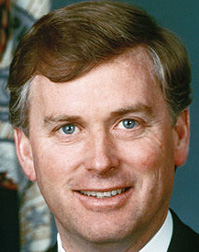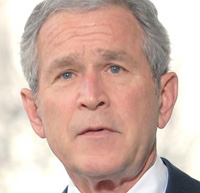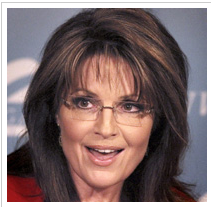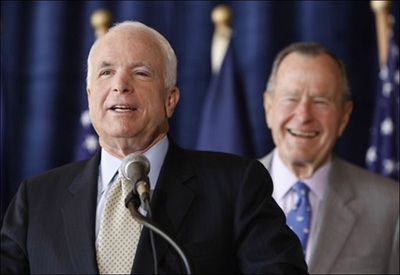The Republican Party has strayed so far from “societal norms” or “polite company” in recent years that it has caused some to ask, “Where have the grown-ups in the party gone?” It’s a fair question, particularly when looking at those members of the Grand Old Party who are currently running for president.
But it wasn’t too long ago that there were indeed grown-ups who very visible in the Republican Party. Some would say that when Ronald Reagan was elected president thirty-five years ago that he was a grown-up, even if his politics ranged further to the right than the two Republicans who had proceeded him, Richard Nixon and Gerald Ford. Importantly, Reagan’s choice for Vice-President, George Herbert Walker Bush, was cut from the cloth of proper establishment Republicans.
As we are learning now, with the imminent release of Jon Meacham’s book, Destiny and Power: The American Odyssey of George Herbert Walker Bush, the elder Bush has been a measured and often cautious man; someone who does not act impulsively and who is not afraid of dissenting opinions in his company. When he became president in 1988, he commanded one of the very few successes that the United States has had in armed conflict since the end of World War II. He put together a coalition of forty-three nations to oppose Iraq’s Saddam Hussein’s invasion of Iraq, and the forces were strong enough to remove the Iraqis from Kuwait in four days.
But when Pappy Bush ran for president on his own right in 1988, he made a startling and strange choice for his vice-presidential running mate, one that opened the door for the “kiddy corps.” His  selection was Indiana Senator Dan Quayle, someone who was known to most as a mental lightweight before he was anointed, and who pretty much convinced the rest of the world of that after he was nominated. We are now familiar with the term “kiddy table” when talking about Republicans running for office, but to get there, one has to perform poorly in the polls. If you were looking for child-like naiveté as a ticket to the table, Quayle might have been seated at the head of the table. Who can forget him saying, “What a terrible thing to have lost one’s mind. Or not to have a mind at all. How true that is.”
selection was Indiana Senator Dan Quayle, someone who was known to most as a mental lightweight before he was anointed, and who pretty much convinced the rest of the world of that after he was nominated. We are now familiar with the term “kiddy table” when talking about Republicans running for office, but to get there, one has to perform poorly in the polls. If you were looking for child-like naiveté as a ticket to the table, Quayle might have been seated at the head of the table. Who can forget him saying, “What a terrible thing to have lost one’s mind. Or not to have a mind at all. How true that is.”
We all have blind spots, and unfortunately for George H.W. Bush, he was also deaf to the advice of many other Republicans when considering Quayle for Number Two. Quayle may have been the first of the recent cadre of young, energetic, not-too-bright, and generally non-empathetic “rising stars” in the Republican Party. He came to us courtesy of a true grown-up, a war hero, and a very credible president, George H.W. Bush.
As tidbits come out about the Meacham book, we learn that Bush 41 had significant issues with the way his son, George W. Bush, ran his two-term presidency. Pappy saw Vice-President Dick Cheney as many others have, as a controlling force who had a war agenda which was central to his vision of foreign policy. 41 also saw 43’s Secretary of Defense, Donald Rumsfeld, as somewhat oblivious to facts.
 Criticizing the administration of George W. Bush is both rather easy and also sad. He never should have been president of the United States. However, there were enough American voters who preferred him as their choice over Al Gore in 2000 that Bush nearly won the vote and actually won the appointment of the Republican-controlled U.S. Supreme Court.
Criticizing the administration of George W. Bush is both rather easy and also sad. He never should have been president of the United States. However, there were enough American voters who preferred him as their choice over Al Gore in 2000 that Bush nearly won the vote and actually won the appointment of the Republican-controlled U.S. Supreme Court.
So George H.W. Bush wittingly brought Dan Quayle to the national scene and then unwittingly brought us his son, George W. We do not really know if Pappy Bush wanted George W. to be president, but from what we can currently tell, Pappy did not tell his son that the job was over his head and it would not be wise to call upon his political chips to try to get there. The bottom line is that one way or another George H.W. Bush brought us George W. The American people confirmed ‘W’s’ so-called readiness to be commander-in-chief.
After ‘W’ was two-termed out, the Republican Party went back to a grown-up in John McCain as their nominee in 2000. McCain was regarded as a serious opponent to Barack Obama, until he made that fateful decision to ask someone he had not previously met to be his vice-presidential nominee. He called upon Governor Sarah Palin of Alaska, who was regarded, again, as a young and energetic Republican firebrand. Unlike Quayle, Palin could rally a conservative crowd, but her knowledge of the news was laid bare when she was asked by CBS’s Katie Couric if she could provide the name of one newspaper or magazine that she reads, and she couldn’t think of any so she blurted, “All of them.”
McCain lost to Obama. Palin soon thereafter quit her governorship in mid-term and has since been somewhat of a darling of the right. Even though she has not sought political office over the past  seven years, she has had a huge impact on the Republican party, both its insiders and its voters. She has taken the main stage and said truly outrageous things reflecting huge gaps in knowledge, in critical thinking and in empathy. These characteristics are now common in most Congressional Republicans. The extremism of Congressional Republicans is why the very conservative John Boehner gave up on managing the Kiddie Table in the Lower Chamber of Congress.
seven years, she has had a huge impact on the Republican party, both its insiders and its voters. She has taken the main stage and said truly outrageous things reflecting huge gaps in knowledge, in critical thinking and in empathy. These characteristics are now common in most Congressional Republicans. The extremism of Congressional Republicans is why the very conservative John Boehner gave up on managing the Kiddie Table in the Lower Chamber of Congress.
Would we have had this brand of Republican had George H.W. Bush not given us Dan Quayle and later his son, and if John McCain had not given us Sarah Palin? The strength of the current extremists is such that they surely would have risen to prominence somehow some way. But the apparent legitimacy that they have in the GOP was greatly strengthened by the nod and a wink from the likes of Pappy Bush and John McCain. They both may well be regretting that now.
